Behind the Scenes of a High School Musical
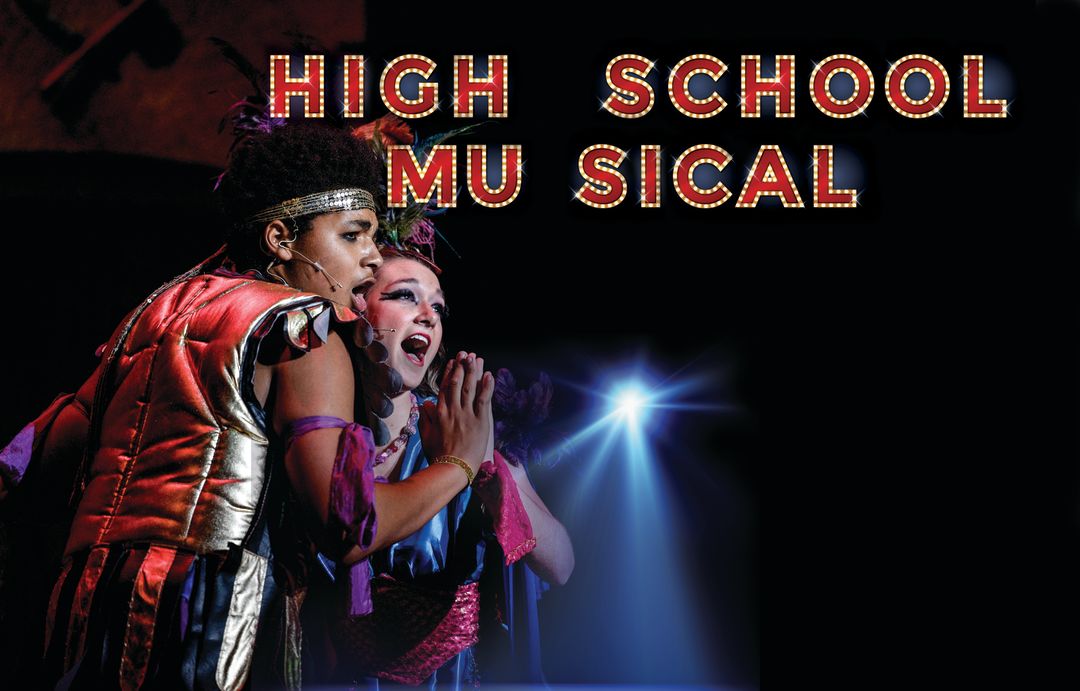
VPA students Dominic Turner and Jordan Boyer on opening night.
“Today, I named the flyers, crawlers, swimmers and hoppers,” announces Adam, the world’s first man, from center stage. We’re not 10 minutes into the opening night of Booker High School’s fall performance of The Apple Tree, and disaster has struck. Adam (played here by a lanky, shaggy-haired charmer named Storm Tracy) is no longer connected to the speakers; his mic stopped working. Storm is projecting like a pro, and the audience hasn’t even noticed. But in about three minutes, Adam is supposed to sing his first song of the evening, an upbeat piece meant to energize everyone for the night of stories ahead. And despite Storm’s capable teenage tenor, unamplified, he’ll be completely inaudible.
Six weeks of hard work by a handful of adults and a small army of adolescents might be undone from the get-go by a technical snafu.
Backstage is a controlled chaos of hushed teenage voices and frantic hand-signals, determined crew members desperate for a solution. Number of adults present backstage: 0. Two-dozen high school students, onstage and off, are working together to keep the show going.
Here’s the thing about high school musical theater. To plan a play is to dream of brilliance. To make it happen in front of an audience is a feat of social, physical and artistic engineering. To do so with teenagers is a miracle. In north Sarasota, the Booker High School Visual and Performing Arts program does this four times a year. The students, who must audition for the program itself (and then again for parts in individual productions) and still complete academic requirements, have in the past included American Idol semifinalist Syesha Mercado and Chicago Fire star Charlie Barnett. (This month, the current Booker company presents its final production of the 2015-2016 season, Pippin, running April 14 to 16.)
The process starts even before the first day of school, as aspiring performers still on summer break turn to the VPA Facebook page for details about The Apple Tree auditions. It’s an old, quirky musical, from the duo who wrote Fiddler on the Roof, comprising three different stories: “The Diary of Adam and Eve,” based on a story by Mark Twain; an Arabian Nights-esque allegory about love and jealousy called “The Lady or the Tiger?”; and “Passionella,” a Cinderella-inspired story of a shy chimney-sweep who dreams of Hollywood stardom.
Just one week into the school year, the students, having honed their audition pieces in front of bedroom mirrors and relatives, take the Booker stage, one by one. Alone in the audience for these early performances are Scott Keys, the tall, affable head of Booker’s theater program and director of The Apple Tree, and jolly Johnnie Mnich, the music director.
First up? Savannah Sinclair, a level four (Booker parlance for “senior”), who’s zeroed in on Passionella from the start. Savannah’s a shoo-in for a Hollywood starlet: powerful voice, confident manner and pretty face framed by a brunette bob. She belts out Passionella’s big number, and then shows her comedy chops, too. For the title character’s alter-ego, the shy, nerdy Ella, Savannah squeaks out a line in a voice she’s been working on, reminiscent of Betty Boop: “Oh, I’m only doing this to make a living.”
For the role of the balladeer in “The Lady or the Tiger?,” level three Rogers Knopik steps to the stage strumming his own guitar. With his long legs and thatch of dirty blond hair, he recalls the minstrel rooster from Disney’s Robin Hood. He sings the balladeer’s opening couplets, “I’ll tell you a truth / That’s hard to swallow. / I’ll tell you a truth, / Oh, listen well.”
New Jersey transplant and level three Dominic Turner—stout Dom, quick with a smirk—lands the warrior general from “The Lady or the Tiger?”; introspective Lilianna Solum, a level four, embodies Eve, both bold and sensitive; class clown Jordan Boyer, the baseball-capped girl next door, was Keys’ first choice for Eve, but the auditions changed his mind. Jordan, instead of innocent Eve, is cast as Barbara in “Tiger”—“the mean, bitchy [character],” according to Keys, but a role with an excellent song to belt.
There are more hopefuls than parts, and there’s a lot of competition. But hard feelings, if there are any, are hidden backstage in a sea of high fives and supportive hugs. Some students land only ensemble parts and the others choose to be part of the crew. Theater is a team sport, and the Booker students understand they’re all in it together.
“You don’t put the third-string quarterback on for educational purposes,” says Keys. “You cast who you think is best.”
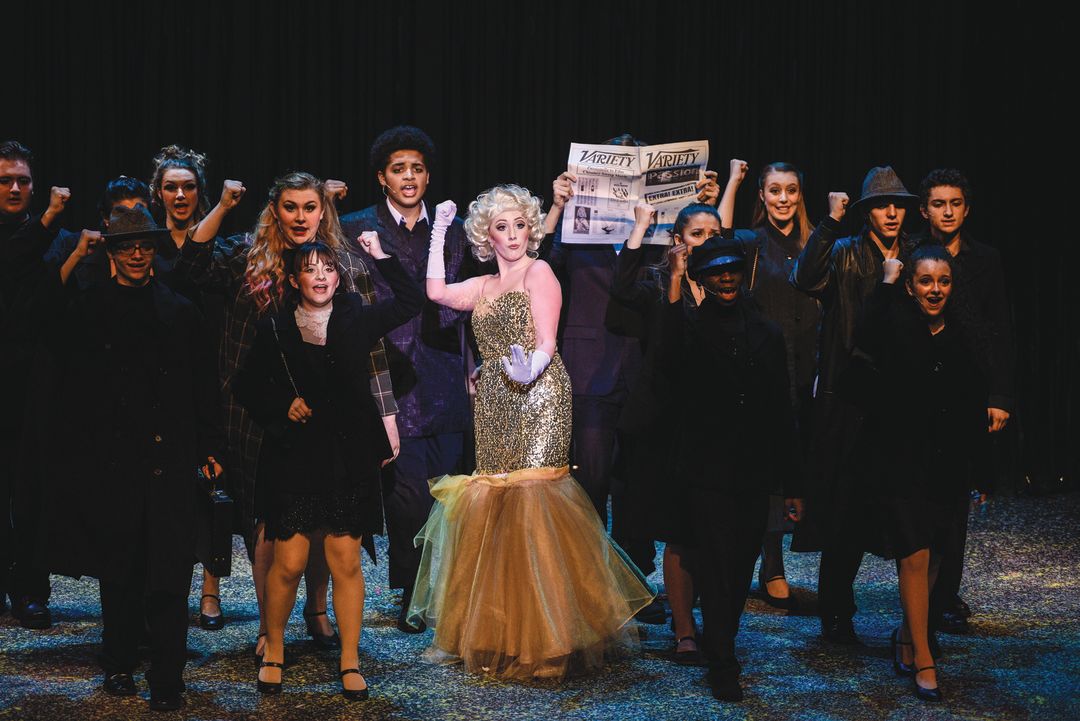
Savannah Sinclair shines as Passionella.
“Please, if there’s a god in heaven, stop,” says Keys as the dance number grinds to a halt. “We just had a little bit of brain-fartage.”
He’s addressing a snag in the nascent choreography for “Passionella,” standing with his back to a wall of mirrors that reflects the cast back at themselves. Rehearsal: Week Two. It’s 3:30 p.m. and they’ll be here until 5, as on every other school day leading up to opening night four weeks from now.
Keys builds his choreography step by step, one motion leading naturally to the next. With each new command, the performers turn to dance captain Hunter Day, a blond level-three ensemble dancer, who demonstrates the action and even suggests some choreography himself. Hunter has been a baseball player most of his life; now, after only three years of study, dance flows naturally from his limbs. He punctuates rehearsal’s idle moments with glissades and pliés.
The students are wearing their school clothes—jeans and cargo shorts, T-shirts and polos. But as Mnich plays the score on an orchestral synthesizer, they transform into glamorous 1950s partygoers, shoulders back and chins high, morphing through a series of formations before coming together as a mass that then parts to reveal Passionella—Savannah in yoga pants and a button-up shirt, on the arm of narrator Rogers, who’s wearing knit shorts and a white T-shirt. And a top hat.
The boys, deep voices sounding very much like men, sing together, “I don’t love Sophia, / I don’t love Bardot, / I love Passionella.”
Keys stops the piece again—“Guys, Sophia Loren, Brigitte Bardot,” he says, “Look them up”—and turns to consult a couple of students individually. There’s about a three-second lull before the rest of the kids descend into theatrical teenage din, a chorus of arabesques and fart jokes.
Savannah, in addition to being the most adult-like of the group, carries added authority as the daughter of Booker’s dance instructor. She talks with some of the other girls about the scene. At the opposite end of the room, Hunter points a graceful toe floorward near a passing classmate and says with mock formality, “Be careful. It would be a shame if you tripped over my tendu.”
Sitting alone on the floor with her back against the mirrored wall is Brennan Beckwith, the new girl, with close-cropped, bright-pink and bleached-blond hair and matching pink tie and pink Converse All-Stars. She’s at home as a theater geek, preferring backstage crew to onstage glory. But she’s still finding her place here, navigating a new year at a new school. Dom, shuffling across the room in socks, reaches out as he passes, silently offers her a chummy high-five.
At the sound of the music starting, the teens turn pro again. Back to their places, they take it from the top.
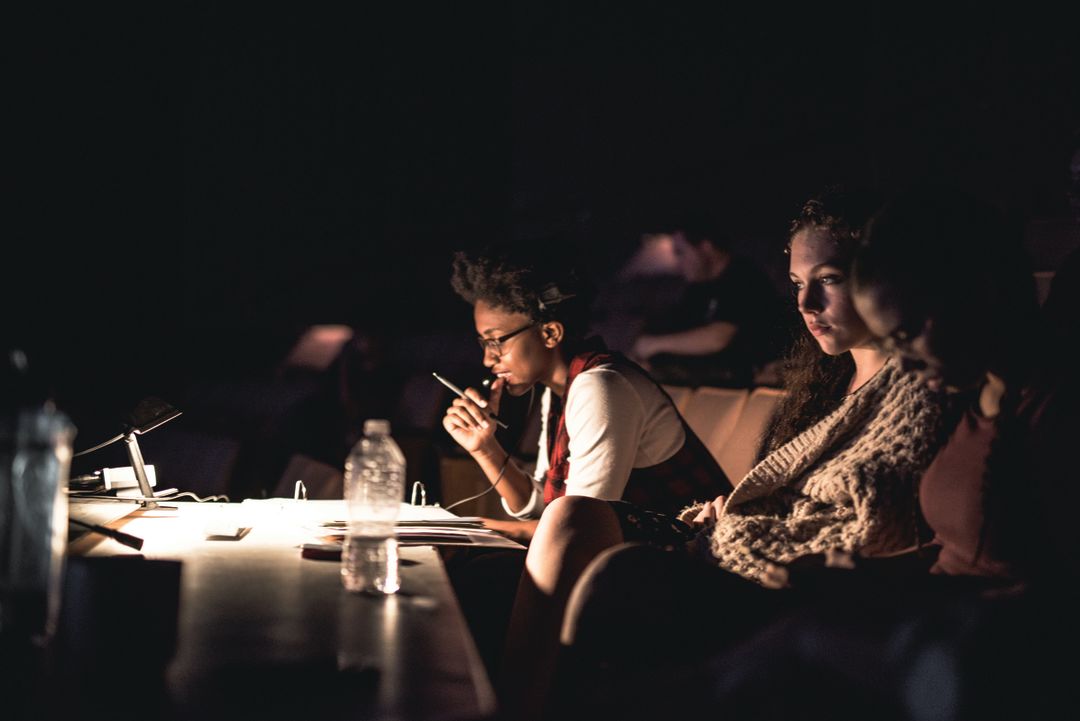
Stage manager Symphony Thompson studies the script.
During the half hour between the end of the school day and the beginning of rehearsal, the kids are almost always buzzing. A giggling group of girls comes through the loading dock and into the backstage hall, which is already a mosh pit of teenage shenanigans that might break out into song—Beyoncé, maybe, or Drake—at any given moment. Dom and Storm wrestle; Savannah holds court with Lili and Jordan; Hunter and Brennan discuss the relationship between actors and crew. “We get along. We just don’t always understand each other,” Brennan says of the two groups. Hunter agrees, “Because we’re—” and mid-sentence he jumps to a split on the floor, “—actors.”
But three hours later, as they trickle back out to the parking lot, climbing into their own cars or ones driven by waiting parents, most are quiet. They are, after all, at the school from dawn until dark, and there’s little time or energy for much else. Throughout the production process, they see more of each other than they do of their families.
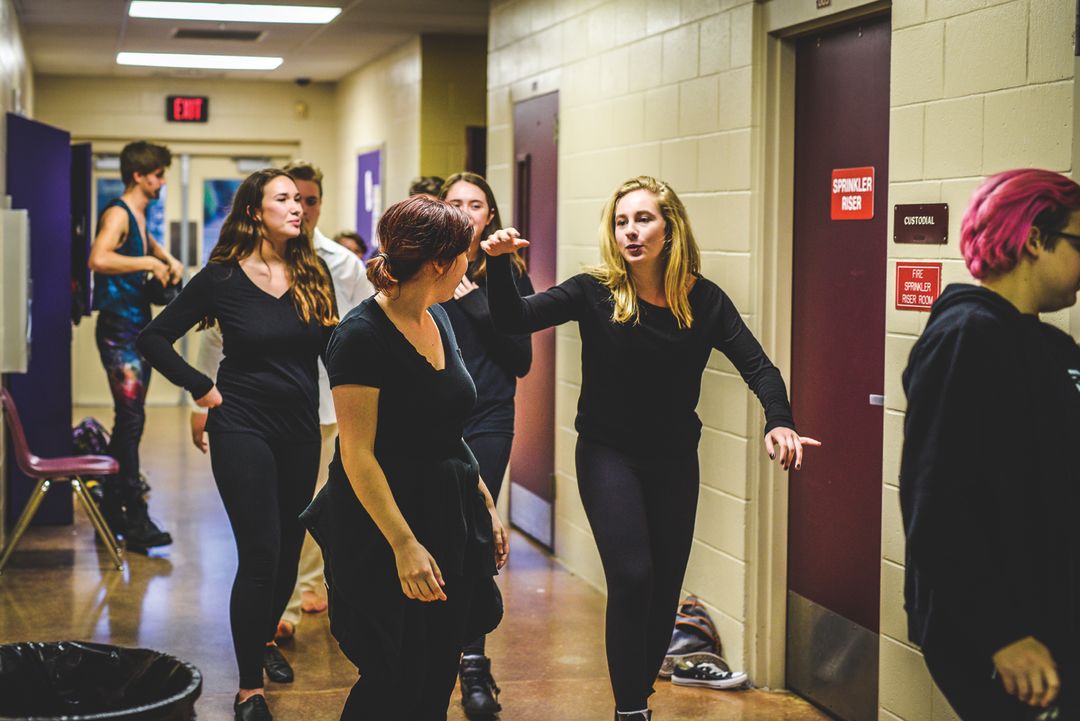
Heading to places on opening night.
“Today, I named the flyers, the...the hoppers, the, uh...argh...line!,” shouts Storm, center stage in Booker’s mostly empty 350-seat theater. Rehearsal: Week Three.
Symphony Thompson, script in hand, calls out from the house, “‘The flyers, crawlers, swimmers and hoppers’!”
“OK, thank you. I’ll work on that,” says Storm.
A small but commanding level three, Symphony—Symph to her classmates—asked to be the stage manager for this production after her aspirations for Eve fell through. She wields her authority with businesslike efficiency that earns respect instead of resentment. “We need quiet in the house, please,” she says.
Another crew member asks, “Did we ever find the—” “We’re fixing it,” Symphony assures him.
Students who aren’t performing are either doing homework on the floor of the backstage hallway or sitting in the first few rows, sometimes exchanging whispered comments but mostly enraptured by the rehearsal process.
As the production moves into tech week, when sound and lighting design are finalized, the house is dark for rehearsals—all light to the stage, just as it will be for the performances—and every moment of the show is polished. “Storm, hold the watering can in your upstage hand,” Keys shouts from the darkness, moving from one side of the house to the other to make sure every angle is accounted for.
Each run-through seems to highlight a new issue that needs to be fixed: A set piece comes only halfway on and then freezes; a spotlight loses its target; a portion of the book of Genesis is omitted. “Did we just skip a chunk?” asks Keys. “Guys, we just rewrote the Bible. Adam and Eve had no children.”
There’s a sense of uncontrolled acceleration, a herd of cattle stampeding toward an end point, either corral or canyon.
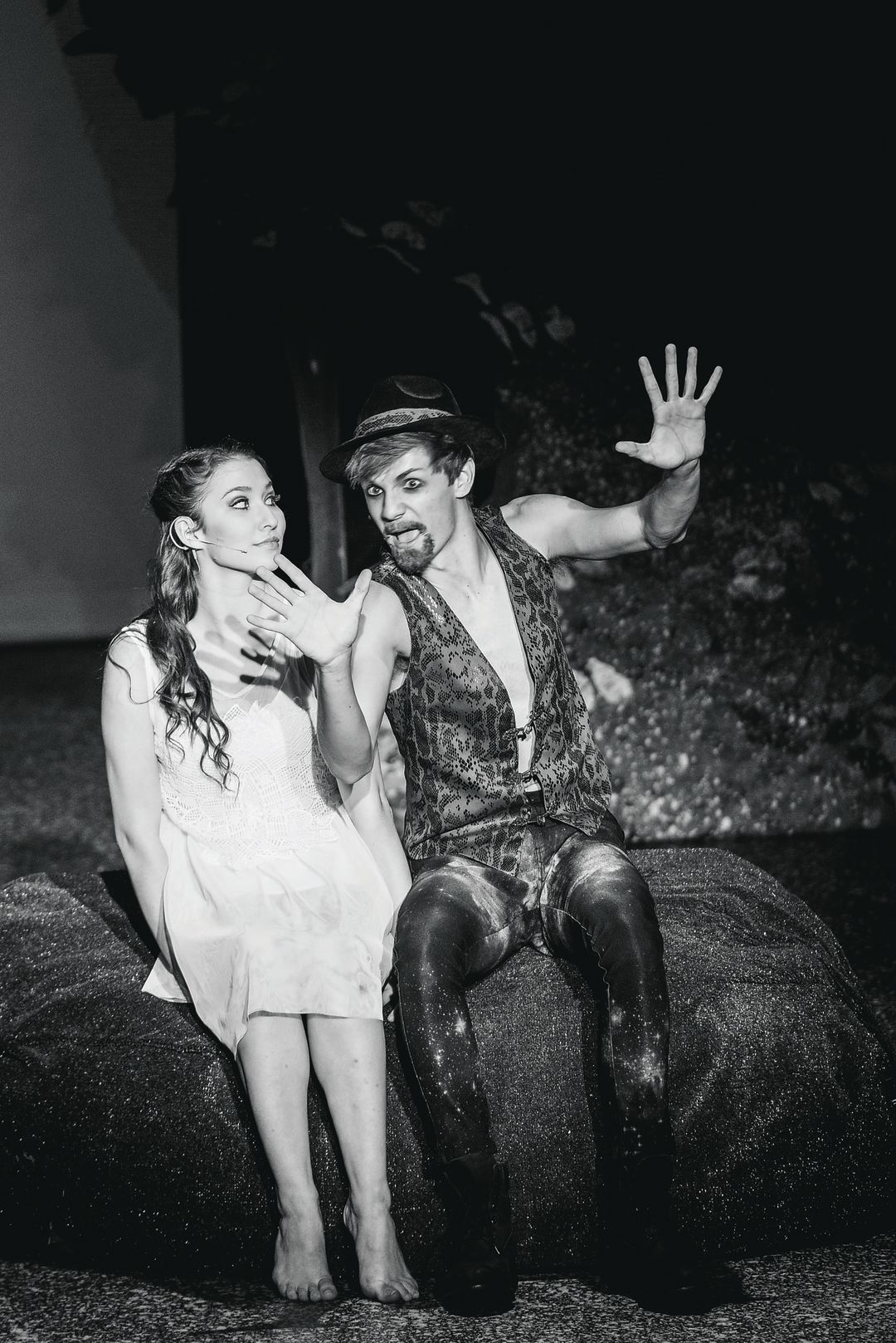
Lilianna Solumn and Rogers Knopik as Eve and the Snake.
“Hey! Are you ready for opening night?” asks Storm of every visitor as he bounces down the backstage hallway.
“I’m ready. Are you ready?” they reply.
“Heck, yeah, I’m ready!”
You’d think they’d be nervous, but to a person the students exude excitement, doing make-up and sharing funny text messages from supportive grandparents. From sound checks to prop placement to sweeping the stage, everyone has a job to do. Symphony dances from checkpoint to checkpoint, singing, “Oooh, this is going to go good. This is going to go so good.”
If anyone seems nervous, it’s Keys. The show now out of his hands, he moves through the wings with cheerful resignation. His visit to dance warm-up elicits a smile, as he realizes he doesn’t know the routine they’re doing. Less than two months into the school year, the students are moving together through a complicated warm-up of their own creation.
Thirty minutes before the actors are to take their places, cast and crew gather in the rehearsal room to stand together in the “Energy Circle.” Keys leads a vocal warm-up, and then everyone holds hands as he addresses the group with words of encouragement and pride, ending with performance advice. “Keep your mind about you,” he tells them, “and don’t get complacent.”
Other students take the floor, generating a chorus of I-love-yous.
“I am so proud of each and every one of you,” says Symphony.
“Thank you guys for loving me and making me feel so welcome,” says Brennan.
The group disbands in electric optimism, every student heading to his or her own place. In two hours, completely spent, they’ll be greeted in the lobby like heroes by a pack of friends and family. Two days from now, at an adult-free closing-night party, they’ll relax and embrace their adolescence again. One month from tonight, they’ll travel to the Florida Theatre Conference in St. Petersburg, where “Passionella” will win first place in the one-act play competition, Rogers will be named to the all-star cast and Savannah will be pronounced best actress in the state. And five months from now, they’ll travel to Greensboro, N.C., to compete in the Southeastern Theater Conference, where they’ll show dozens of other high school theater companies just what Booker students can do.
But on opening night, when Storm’s mic goes out, there’s no time to contemplate any of that. One full minute passes, from the moment Storm’s lines tumble out unamplified to the breakthrough backstage when they replace the faulty batteries and the mic hums back to life. Sixty seconds of panic is an eternity in theatrical terms, but they don’t have time to dwell on that, either.
The music starts, and Storm charges forth into the spotlight, arms wide, the words flowing out of the speakers. “There’s nothing in the whole of Eden / More pleasant to see,” he sings. The show goes on.



